Mamiya C
The Mamiya C series is a line of twin-lens reflex medium-format system cameras manufactured by Mamiya between 1956 and 1994. It was developed from the Mamiyaflex series of cameras built from 1949 to 1956. The Mamiya C series was initially aimed at the professional market, but some later models were intended for amateurs. Unlike most TLR cameras, the Mamiya C has interchangeable lenses. The upper and lower lenses come off as a unit, and are available in at least seven different focal lengths. The lower lens of each unit has an aperture diaphragm as well as a leaf shutter. A flash sync terminal is part of the lens unit, and the delay can be set to M or X mode. The camera has an interlocking baffle that enables lenses to be changed without exposing the film. Focusing is done via a bellows system on the front side of the camera. Early models had separate film advance and shutter cocking mechanisms; on later models the shutter was automatically cocked. There is no metering in the camera body, so an external light meter is necessary. Viewfinders with built-in meters were available as accessories with later models.
Models
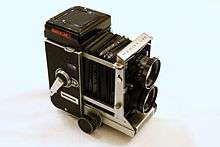
While the basic shape remained the same, the bodies increased with size over time. The C22 and C220 models were aimed at amateurs and had fewer features, but were also lighter than the C33 and C330 models. Two models were made with Mamiyaflex on the nameplate attached to the viewfinder.
- Mamiyaflex C Professional (1956) — 120 film, knob winder, manual shutter cocking
- Mamiya PF (1957) — police model
- Mamiyaflex C2 Professional (1958) — 120 film, knob winder, manual shutter cocking
- Mamiya C3 Professional (1962) — 120 film, crank winder, manual shutter cocking
- Mamiya C33 Professional (1965) — 120 film, crank winder, automatic shutter cocking
- Mamiya C22 Professional (1966) — 120 film, knob winder, manual shutter cocking
- Mamiya C220 Professional (1968) — 120/220 film, knob winder, manual shutter cocking
- Mamiya C330 Professional (1969) — 120/220 film, crank winder, automatic shutter cocking
- Mamiya C330f Professional (1975) — 120/220 film, crank winder, automatic shutter cocking
- Mamiya C220f Professional (1982) — 120/220 film, knob winder, manual shutter cocking
- Mamiya C330s Professional (1983) — 120/220 film, crank winder, automatic shutter cocking
Lenses
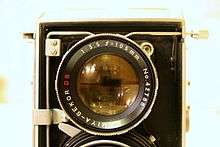
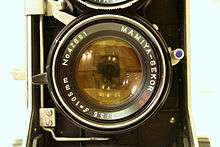
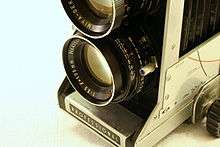
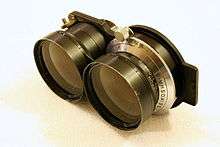
Lenses for the Mamiya C series have been grouped by users into three different series based on the appearance and model of the shutter: first chrome, second chrome, and black. Most lenses can be used on most bodies, but some combinations won't allow for automatic shutter cocking. The first chrome series had Seikosha-MX shutters with speeds from 1 s to 1/400 s. The second chrome series had Seikosha-S shutters with speeds from 1 s to 1/500 s, plus Bulb. A few chrome shutter lens had a Seikosha-SLV shutter. The black series had Seiko shutters, except for the 80 mm lens which had a Copal shutter.
- Mamiya-Sekor 55mm f4.5 (black, Seiko)
- Mamiya-Sekor 65mm f3.5 (chrome, Seikosha-MX
- Mamiya-Sekor 65mm f3.5 (chrome, Seikosha-S)
- Mamiya-Sekor 65mm f3.5 (black, Seiko)
- Mamiya-Sekor 80mm f2.8 (chrome, Seikosha-MX)
- Mamiya-Sekor 80mm f2.8 (chrome, Seikosha-S)
- Mamiya-Sekor 80mm f2.8 (black, Copal)
- Mamiya-Sekor 80mm f2.8 S (black, Copal)
- Mamiya-Sekor 80mm f3.7 (chrome, Seikosha-SLV) - rare
- Mamiya-Sekor 80mm f3.7 (black, Copal) - rare
- Mamiya-Sekor 105mm f3.5 (chrome, Seikosha-MX)
- Mamiya-Sekor 105mm f3.5 (chrome, Seikosha-S)
- Mamiya-Sekor 105mm f3.5 (black, Seiko)
- Mamiya-Sekor 105mm f3.5 D (black, Seiko)
- Mamiya-Sekor 105mm f3.5 DS (black, Seiko)
- Mamiya-Sekor 135mm f4.5 (chrome, Seikosha-MX)
- Mamiya-Sekor 135mm f4.5 (chrome, Seikosha-S)
- Mamiya-Sekor 135mm f4.5 (black, Seiko)
- Mamiya-Sekor 180mm f4.5 (chrome, Seikosha-MX)
- Mamiya-Sekor 180mm f4.5 (chrome, Seikosha-S)
- Mamiya-Sekor 180mm f4.5 (black, Seiko)
- Mamiya-Sekor 180mm f4.5 Super (black, Seiko)
- Mamiya-Sekor 180mm f4.5 Super (black, Seiko-SLV)
- Mamiya-Sekor 250mm f6.3 (black, Seiko) - manual cocking on all bodies
Accessories
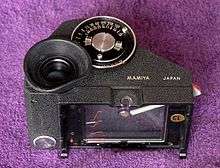
The Mamiya C series were marketed as system cameras, and over time a wide array of accessories were offered. Not all accessories are fully compatible with all camera bodies.
- Viewfinders - Magnifying hood, CdS finder, Porrofinder, CdS Porrofinder, Prism finder
- Viewfinder masks - for 105 mm, 136 mm, 180 mm, and 250 mm lenses
- Focusing screens - matte, crosshair, checker, rangefinder spot, microprism
- Pistol grips - bottom-mounted
- Grips - side-mounted
- Flashgun bracket
- Flashgun Pro Deluxe II
- Paramender - special tripod mount that helps with parallax issues
- Single-exposure back - for cut film and plates; three different models over time
- Lens hoods, cases, tripod quick releases, etc.
See also
| Wikimedia Commons has media related to Mamiya cameras. |
Notes
- 6x6 cameras at the Mamiya Camera Museum
External links
- Mamiya C page at Camera-wiki.org
- MAMIYA Camera Instruction Manuals